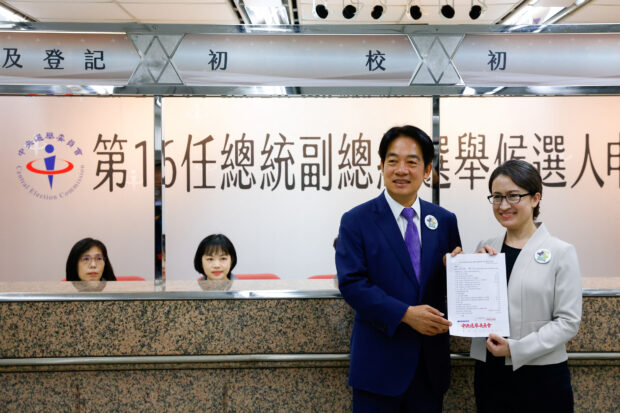
Taiwan’s Vice President Lai Ching-te and running mate Hsiao Bi-Khim pose for a photo after registering for the upcoming presidential election at the Central Election Commission in Taipei, Taiwan November 21, 2023. REUTERS
TAIPEI — Taiwan’s people have to choose in next year’s election whether the island keeps moving forward on a road to democracy or “walks into the embrace of China”, the frontrunner to be the next president said on Tuesday.
The issue of China, which claims Taiwan as its own territory, looms large ahead of the Jan. 13 presidential and parliamentary elections, especially as Beijing has been stepping up its military pressure on the island.
Lai Ching-te, vice president and the ruling Democratic Progressive Party’s (DPP) presidential candidate, has led in most opinion polls ahead of the election. The DPP champions Taiwan’s separate identity from China.
The largest opposition party, the Kuomintang (KMT), which traditionally favors close ties with Beijing, is locked in a dispute with the smaller Taiwan People’s Party (TPP) about which of their candidates should run as president and which as vice president after agreeing to work together.
Lai, speaking to reporters and supporters after formally registering his candidacy with the election commission, said Taiwan’s security was an international issue and the world was watching the election.
“The people of Taiwan have to choose between trusting Taiwan, allowing Taiwan to continue to move forward on the road of democracy, and relying on China, following the old path of the one-China principle, and walking into the embrace of China,” he said.
Beijing has demanded that Taipei accepts that both sides of the Taiwan Strait belong to “one China”, which the DPP-led government has rejected saying only the island’s people can decide their future.
Lai on Monday announced Taiwan’s high-profile former de facto ambassador the United States, Hsiao Bi-khim, as his running mate.
Like Lai, Hsiao is vilified by China, which has twice placed sanctions on her, most recently in April, saying she was an “independence diehard”.
Late on Monday, Chinese state television lambasted the Lai-Hsiao team in a commentary, saying they were “colluding villains”.
“Taiwan independence means war. The Lai-Hsiao independence double act will intensify cross-strait tensions and conflict,” the broadcaster said in the commentary posted on its website.
Lai has dismissed China’s criticism, saying on Monday it was further proof of its efforts to interfere in the election.
Lai, standing next to Hsiao outside the election commission, said he was full of confidence.
“We both deeply love this land, passionately love this country,” he added.
The election registration deadline is Friday. It is not clear when the opposition parties will register their candidates.
The KMT’s presidential candidate, Hou Yu-ih, said he had spoken with the TPP’s presidential candidate and party chairman Ko Wen-je on Tuesday and expressed his “sincerity” in wanting to keep talking about how they should team up.
“From start to finish I have never insisted I had to be the lead,” Hou said, referring to being the presidential rather than vice presidential candidate.
Ko, a former Taipei mayor who founded the TPP in 2019, said on Sunday he would “continue to fight to the end as the TPP’s presidential candidate”.

